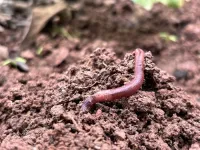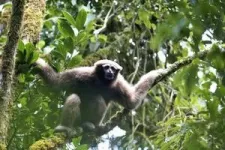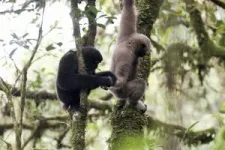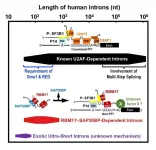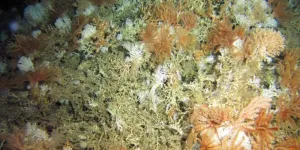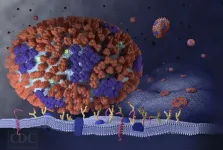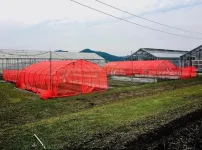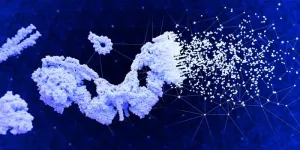Pesticides to help protect seeds can adversely affect earthworms’ health
2024-02-14
(Press-News.org) While pesticides protect crops from hungry animals, pesky insects, or even microbial infections, they also impact other vital organisms, including bees and earthworms. And today, research published in ACS’ Environmental Science & Technology Letters reveals that worms are affected by the relatively small amounts of chemicals that can leach out of pesticide-treated seeds. Exposure to nonlethal amounts of these insecticides and fungicides resulted in poor weight gain and mitochondrial DNA (mtDNA) damage in the worms.
Pesticide treatment can be introduced at several different stages of a plant’s life, either by covering seeds before they’re sown or spraying already grown crops. Oftentimes, different chemicals are applied at the same time to maximize their efficiency. Neonicotinoids, also known as neonics, are one common class of insecticides used today in the U.S. and other countries, though many of them are banned in the European Union. Recent research has shown that these insecticides and many fungicides persist in groundwater and soil, where earthworms may encounter them. One method to monitor the health of the impacted worms is through changes to the organisms’ weight and mtDNA damage. Unlike DNA held in a cell’s nucleus, mtDNA can’t repair itself as well, and thus can help indicate less obvious, “off target” effects of a particular environmental toxin. Chensheng (Alex) Lu and colleagues wanted to use this approach to investigate how realistic amounts and combinations of neonics and difenoconazole (DIF) fungicide affected earthworms.
In laboratory experiments, the team exposed groups of juvenile earthworms (Eisenia fetida) to individual pesticides, and combinations of neonics and DIF, in concentrations that mimicked residues left behind by pesticide-treated seeds. After 30 days, the worms were weighed and their mtDNA damage was examined. While all the worms survived, the earthworms in single pesticide-treated soil gained 30 to 80% less weight during that period than a control group living in untreated soil. Additionally, the worms exposed to one of the four tested neonicotinoids and DIF at the same time gained considerably less weight than those exposed to a single compound. Pesticide exposure also resulted in a significant increase in mtDNA damage. Because mitochondria generate most of the energy within cells, damage to their DNA could interrupt cellular functions and other metabolic processes. The researchers say that these findings establish a link between neonics and fungicide mixtures that are likely present in the environment and earthworm health, which could inform the unexpected risks of using neonics in seed treatments.
The authors acknowledge funding from the National Natural Science Foundation of China.
The paper’s abstract will be available on Feb. 14 at 8 a.m. Eastern time here: http://pubs.acs.org/doi/abs/10.1021/acs.estlett.3c00914
For more of the latest research news, register for our upcoming meeting, ACS Spring 2024. Journalists and public information officers are encouraged to apply for complimentary press registration by completing this form.
###
The American Chemical Society (ACS) is a nonprofit organization chartered by the U.S. Congress. ACS’ mission is to advance the broader chemistry enterprise and its practitioners for the benefit of Earth and all its people. The Society is a global leader in promoting excellence in science education and providing access to chemistry-related information and research through its multiple research solutions, peer-reviewed journals, scientific conferences, eBooks and weekly news periodical Chemical & Engineering News. ACS journals are among the most cited, most trusted and most read within the scientific literature; however, ACS itself does not conduct chemical research. As a leader in scientific information solutions, its CAS division partners with global innovators to accelerate breakthroughs by curating, connecting and analyzing the world’s scientific knowledge. ACS’ main offices are in Washington, D.C., and Columbus, Ohio.
To automatically receive news releases from the American Chemical Society, contact newsroom@acs.org.
Note: ACS does not conduct research, but publishes and publicizes peer-reviewed scientific studies.
Follow us: Twitter | Facebook | LinkedIn | Instagram
END
ELSE PRESS RELEASES FROM THIS DATE:
2024-02-14
In humans, the length of pre-mRNA varies extensively (from 30 to 1,160,411 nucleotides by recent studies). The fundamental mechanism of splicing has been studied with model pre-mRNAs including 158- and 231-nt introns, for historical instance, that are spliced very efficiently in vitro and in vivo. Such an ideal pre-mRNA contains good splicing signal sequences, i.e., the 5′ splice site, the branch-site (BS) sequence, and the polypyrimidine tract (PPT) followed by the 3′ splice site that are recognized by U1 snRNP, U2 snRNP and U2AF2–U2AF1, respectively. Prof. Mayeda says, “Given the diverse lengths ...
2024-02-14
Corals searching for food in the cold and dark waters of the deep sea are building higher and higher mountains to get closer to the source of their food. But in doing so, they may find themselves trapped when the climate changes. That is shown in the thesis that theoretical ecologist Anna van der Kaaden of NIOZ in Yerseke and the Copernicus Institute for Sustainable Development in Utrecht will defend on Feb. 20 at the University of Groningen. “When the water gets warmer, these creatures prefer to be deeper, but a coral doesn’t just walk down the mountain,” Van der Kaaden said.
Deep and dark
Unlike the famous, colorful tropical corals, cold-water corals live ...
2024-02-14
Surgeons who routinely change surgical gloves and instruments are incurring similar costs to those using the same equipment, a new study has found.
The economic evaluation funded by the UK’s National Institute for Health and Care Research (NIHR) follows a clinical trial conducted at 80 hospitals in Benin, Ghana, India, Mexico, Nigeria, Rwanda, and South Africa which established that routine change of gloves and instruments reduces surgical site infections (SSIs) by 13%.
The evaluation, published by the Lancet Global ...
2024-02-14
Scientists have long thought of the fluid-filled sac around our lungs merely as a cushion from external damage. Turns out, it also houses potent virus-eating cells that rush into the lungs during flu infections.
Not to be confused with phages, which are viruses that infect bacteria, these cells are macrophages, immune cells produced in the body.
“The name macrophage means ‘big eater.’ They gobble up bacteria, viruses, cancer cells, and dying cells. Really, anything that looks foreign, they take it up and destroy it,” said UC Riverside virologist Juliet Morrison, who led the discovery team. “We were surprised to find them in the lungs ...
2024-02-14
USC, together with Leonard and his late wife Pamela Schaeffer, is launching a new institute with a $59 million gift from the Schaeffers to be anchored in Los Angeles and in the university’s new Capital Campus in Washington, D.C. The mission of the Leonard D. Schaeffer Institute for Public Policy & Government Service is to strengthen democracy by training generations of public leaders and advancing evidence-based research to shape policy that addresses the nation’s most pressing issues, USC President Carol Folt announced ...
2024-02-14
ANN ARBOR—Using social media data and artificial intelligence in a comprehensive national assessment, a new University of Michigan study reveals that nearly 15% of Americans deny that climate change is real.
Scientists have long warned that a warming climate will cause communities around the globe to face increasing risks due to unprecedented levels of flooding, wildfires, heat stress, sea-level rise and more. Though the science is sound—even showing that human-induced, climate-related natural disasters are growing in frequency ...
2024-02-14
Red nets are better at keeping away a common agricultural insect pest than typical black or white nets, according to a new study. Researchers experimented with the effect of red, white, black and combination-colored nets on deterring onion thrips from eating Kujo leeks, also called Welsh onions. In both lab and field tests, red nets were significantly better at deterring the insect than other colors. Also, in field tests, onion crops which were either partially or fully covered by red netting required 25-50% less insecticide than was needed for a totally uncovered field. Changing agricultural nets from black or white to red could help reduce pesticide ...
2024-02-14
A new artificial intelligence (AI) tool that draws logical inferences about the function of unknown proteins promises to help scientists unravel the inner workings of the cell.
Developed by KAUST bioinformatics researcher Maxat Kulmanov and colleagues, the tool outperforms existing analytical methods for forecasting protein functions and is even able to analyze proteins with no clear matches in existing datasets[1].
The model, termed DeepGO-SE, takes advantage of large language models similar to those ...
2024-02-14
A research paper published today (14 February 2024) in Nature Cancer details new insights into the role of efferocytosis – the burying of dead cells – in pancreatic cancer that spreads to the liver.
Liver metastasis occurs in 40–50% of people with pancreatic ductal adenosarcoma (PDAC), and there are currently no effective therapies to cure pancreatic cancer patients that have liver metastasis.
Led by University of Liverpool’s Professor Michael Schmid and colleagues, this study found PDAC metastases to show high levels of immunosuppressive macrophages, a type of white blood ...
2024-02-14
Fear and addiction exert significant influence within society. Managing them is often challenging, as they are driven by intricate neuronal circuits in our brains. Understanding the underlying molecular mechanisms is crucial to intervene when these processes malfunction. Pioneered by scientists at the Institute of Science and Technology Austria (ISTA), the novel “Flash and Freeze-fracture” technique provides a unique glimpse into the respective brain region. The results were recently published in the journal PNAS.
While looking for food, a bird encounters a fox. It gets away just in time, but the sight ...
LAST 30 PRESS RELEASES:
[Press-News.org] Pesticides to help protect seeds can adversely affect earthworms’ health
